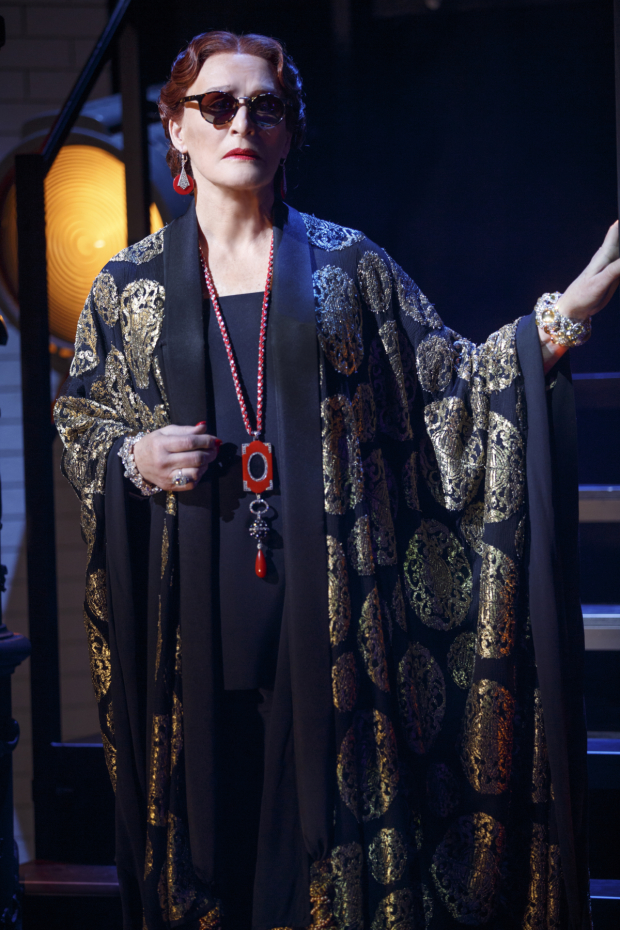Sunset Boulevard
Glenn Close returns to the role of Norma Desmond in this new revival of Andrew Lloyd Webber’s musical, complete with a 40-piece orchestra.

Palace Theatre.
(© Joan Marcus)
Anyone lucky enough to see Glenn Close as Norma Desmond in Sunset Boulevard at the Palace Theatre will have bragging rights for the rest of their lives. Returning to the role in Lonny Price's new production of Andrew Lloyd Webber, Don Black, and Christopher Hampton's Tony-winning musical, Close delivers as if no time has gone by at all. Joined by a 40-piece orchestra that fills the ornate Palace to its highest balcony, we're privileged to witness theater history in the making.
It should come as no surprise that Close's performance is as good as it is; after all, when she originated the part in the 1994 Broadway production at the Minskoff Theatre, she won that season's Tony for Best Actress in a Musical. More than two decades have gone by since then. Close is older and wiser, and her singing voice occasionally falters. Yet it works in the service of this fabulous gorgon of a character, a faded silent movie actress stuck in a world of delusions, who takes a shine to a wannabe screenwriter and convinces him to collaborate on her comeback.
Inspired by Billy Wilder's legendary film of the same title, Sunset Boulevard is told from the perspective of this screenwriter, Joe Gillis (Michael Xavier), a man we first meet as he floats dead in Norma's swimming pool. Narrating from the afterlife, Joe takes us on his journey through the events that lead to his death. He lands on the doorstep of Norma's grandiose mansion as he tries to outrun a pair of repo men searching for his car. Called in by the lady of the house herself, Joe quickly recognizes her as the now-forgotten silent film star she is. ("You used to be big," he says in one of the motion picture industry's most famous exchanges. "I am big," she replies. "It's the pictures that got small.")
Soon, Joe is living in Norma's guest room and helping her fix up a screenplay she created for presentation to her former director, Cecil B. DeMille (Paul Schoeffler). At the same time, he's got an ongoing flirtation with Betty Schaeffer (Siobhan Dillon), an aspiring writer who happens to be engaged to his best pal, Artie (Preston Truman Boyd). What he doesn't recognize is that the over-the-hill Norma, potentially spurred on by her looming manservant Max (Fred Johanson), has a blooming infatuation for him, one that will drive them both to their limits.
The original Broadway production was known for its glitz. John Napier's now-iconic scenery not only depicted Norma's mansion in all its gilded glory, but also seamlessly managed to float in and out allowing for cinematic transitions. To a degree, this new Sunset, which premiered at the English National Opera in 2016 and features the same four central cast members, is scaled down. James Noone's set is a lot simpler, a dizzying series of crisscrossing staircases that evokes the art of M.C. Escher. Tracy Christensen's period-perfect costumes rarely change from scene to scene, while Mark Henderson's lighting calls to mind film noir.
However, Price doesn't let us forget that Sunset Boulevard is a big musical. His ensemble numbers 26 and is loaded with recognizable Broadway faces like Nancy Anderson, Graham Rowat, and Jim Walton. The orchestra, under the baton of Kristen Blodgette, is onstage for the entire show in a band shell dead center. In the big numbers (choreographed with unfortunately minimal pizzazz by Stephen Mear), the actors use highly expressive, broad gestures that never really mesh with the witty cynicism of Black and Hampton's lyrics. And while their book, which hews very closely to the original screenplay, is essentially a series of two- or- three-person scenes, Price's discombobulating staging, which often features his actors running up and down the Escher stairs to nowhere, doesn't really achieve a feeling of intimacy that would allow us to care about Xavier's Joe, hunky but vanilla, or Dillon's Betty, good but ordinary.
All bets are off when Close hits the stage (likely to get several rounds of entrance applause as she descends each level of stairs). Her Norma is simultaneously of this world and not, a deeply human alien that is desperate to be wanted and yet all too cognizant of the fact that she's yesterday's news. She wisely resists becoming the grotesque kabuki figure immortalized on-screen by Gloria Swanson. Close simply plays Norma as a person, albeit a larger-than-life one, who has lived so long in the past she's forgotten what reality looks like. It helps that alongside Christensen's expressive clothing, Close is wearing some of the original costumes, created by Anthony Powell for the 1994 production, almost allowing the actress herself to step back in time. Onstage, however, this ivory-tower facade is constructed with the help of Johanson's Max, who is the perfect enabler for Norma.
The highlights of the evening, of course, are Close's renditions of Norma's two big songs, "With One Look" and "As If We Never Said Goodbye." Backed by Blodgette's glorious orchestra playing the sumptuous orchestrations devised by Webber and David Cullen, Close provides a master class in song delivery. It's not cliché to say that we can hear a pin drop during each number as she commands the spotlight in triumph. Through a single glance, Close manages to communicate all we need to know about Norma's emotions, breaking our hearts or reveling in her mania, bringing us to the edge of our seats on every line.
In these moments, Glenn Close is Norma Desmond herself, igniting a blaze and returning to her glory days, as the lyrics go. She's back at last, and it's absolutely thrilling.








